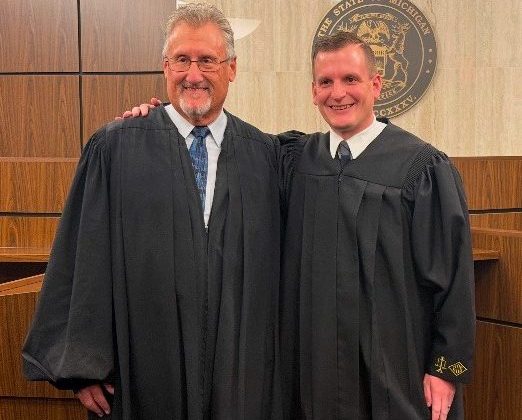

Newly-retired Shelby Township district court judge Douglas Shepherd could have run for another six-year term to push his tenure on the bench to three decades. But he declined to do so.
“I thought I’d like to retire when I was still healthy,” said the 69-year-old former judge at 41A District Court in Shelby Township.
Shepherd could have gone for one more term because he had not yet turned 70, the mandatory age for retirement for judges in Michigan to win election.
Instead, Shepherd plans to serve as a visiting judge as a substitute at various courts in the area on a part-time basis while also golfing, spending time with his family, including his grandchildren, going to their vacation home in Myrtle Beach, N.C., and completing his “honey-do list” from his wife, Brenda, he said.
“I’m just going to enjoy retirement and time with my family,” he said.
Already this year, he served as a visiting judge in 42-II District Court in New Baltimore.
Shepherd said he campaigned hard going door-to-door in support of his son, Eric, who won the open seat on the four-jurist, two-division 41A bench. Eric was assigned to the three-judge division at the Sterling Heights courthouse while Chief Judge Stephen Sierawski assigned himself to the very busy Shelby Township division. Eric Shepherd defeated Sierawski’s son, Patrick, in the battle of footstep followers.
“I’m very proud of him,” Shepherd said of his son.
During his time, Douglas Shepherd presided over several preliminary examinations for capital and other high-profile cases, including ones involving defendants Albert Donadio, the “Shelby Five” protesters, Neil Kalina, Theresa Bieniewcz, Philip Frame and co-defedants Shannon Kammer and Robert Seifert.
During his last month in office, he presided over the trial and sentencing of Jose Eugenio Medina-Hernandez, a Mexican national who was convicted for a double-fatal crash earlier in the year and was mentioned by Vice President J.D. Vance during his speech on township property during last year’s presidential campaign as well as others in citing weak border and immigration policies at the time.
District judges preside over misdemeanor criminal cases and felony cases through the preliminary examination stage, at which they determine whether the case should be bound over to circuit court for a resolution. They also oversee civil cases involving less than $25,000, civil infractions, and landlord-tenant and eviction cases and can conduct marriages.


 PREVIOUS ARTICLE
PREVIOUS ARTICLE
